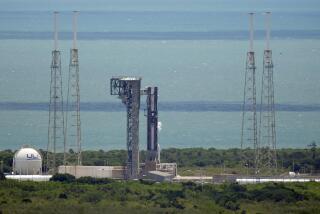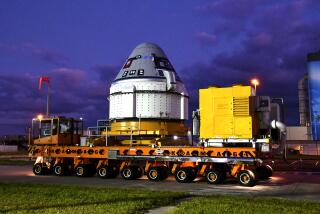Jammed Bolt, Tricky Winds Delay Shuttle
- Share via
CAPE CANAVERAL, Fla. — A single, cross-threaded bolt and tricky crosswinds combined today to force yet another departure delay for the space shuttle Challenger and its much ballyhooed passenger, New England schoolteacher S. Christa McAuliffe. The setback threatens an ambitious attempt to gain a close-up look at Halley’s comet.
Postponement came three hours after a scheduled 6:37 a.m. PST launch. While NASA officials blamed winds, precious time was lost when technicians were forced to wield a hacksaw and power drill against a common, four-inch bolt attached to a hatch door handle.
It took an hour to free the jammed bolt and detachable handle, and the delay was compounded by the discovery that a battery-operated power drill was too weak to complete the job.
By the time the shuttle was ready for blastoff, chill winds whipped up to 30 knots, conditions considered dangerous in the event the spacecraft should need to return to Kennedy Space Center for an emergency landing.
‘Just Not Our Day’
“It was just not our day,” said Robert Sieck, National Aeronautics and Space Administration launch director.
Sieck said another launch will be tried Tuesday morning at 6:38 a.m. PST. However, a severe overnight frost was forecast for much of Florida, and should it occur there most likely would be further rescheduling, perhaps after Thursday.
NASA scientists said that after Thursday the harvest of information about Halley’s comet to be gathered by a tiny probe would diminish.
“I just hope we get off tomorrow,” said Morgan Windsor, mission manager for the so-called Spartan-Halley probe.
Time Can Be Salvaged
Windsor said that if the shuttle is launched by Thursday, about half the comet viewing time can be salvaged. After that, the fruits of the $4-million experiment could become scarce.
In addition to the Halley’s experiment, the mission agenda for the seven-member crew calls for the deployment of an important NASA tracking satellite and other studies.
Also to be taken aloft are 32 fertilized eggs, subjects of a student project to determine, among other things, whether chickens can be grown by future colonists in the last frontier. The experiment is sponsored by Kentucky Fried Chicken.
Most attention, however, has focused on McAuliffe, the 37-year-old New Hampshire woman destined to become the first American teacher in space. The high school social science instructor was selected from thousands of applicants who responded to President Reagan’s declaration that the first private U.S. citizen in space should be an educator.
More to Read
Sign up for Essential California
The most important California stories and recommendations in your inbox every morning.
You may occasionally receive promotional content from the Los Angeles Times.














